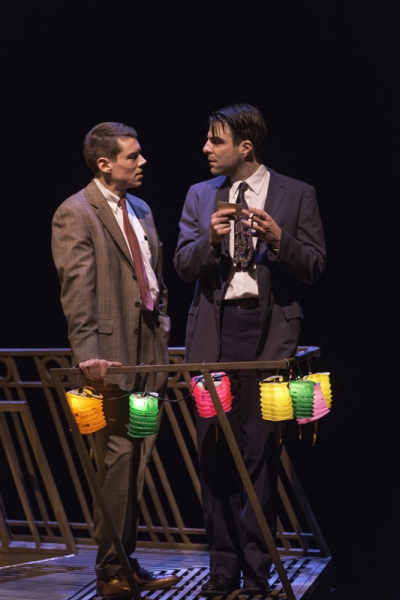In John Tiffany’s absorbing production of The Glass Menagerie (seen in New York in 2013, now playing at the Edinburgh International Festival), isolation is a defining note. The Wingfield family’s St Louis apartment is lapped by inky water, so that the rooms appear like islands. They’re marooned.
The Wingfields are feely – so much feely – but rarely touchy. Cherry Jones’ mother cajoles and commands; Kate O’Flynn’s sister halts and hides away. Neither gets huggy with Michael Esper’s Tom, their respective son and brother. Tom, also the play’s narrator, shares a firstname with Tennessee Williams, and is usually read as an autobiographical extension of the playwright. If the writer is gay, what of the character? Only when Seth Numrich’s buoyant gentleman caller arrives, unaware that he has been set up as a suitor for sister, does the production belatedly allow physical contact. He and Tom slap each othr on the back, rest hands on each other’s shoulders. It’s a dude’s horseplay, but each touch registers the homoerotic desire that the play overtly avoids.
It’s a subtle note in the production, but a vital one. All the characters but Tom are placed in a romantic frame, discussing relationships past, present and potential. But what of Tom? Desire ripples through his speeches on the hot music spilling out of the dancehall, on the restless call of the sea to which he eventually succumbs. And it’s there, surely, in Williams’ own biography, a catalogue of brave relationships and brazen hook-ups. Without strain, Tiffany’s production restores Williams’ homosexuality to his breakthrough hit, makes sense of a loquacious character who doesn’t quite explain himself.
Twenty years ago, queering the canon was all the rage. In Shakespeare, the relationship between Achilles and Patroclus in Troilus and Cressida would seem unabashedly erotic, while the characters of Antonio (in Twelfth Night and The Merchant of Venice) would be shown in complicated thrall to fickle younger men. Filmed by Derek Jarman, staged by Gerard Murphy, Edward II challenged Dr Faustus to be considered Marlowe’s most pertinent tragedy. Queer subtexts were unearthed beneath the heterosexual mechanism of The Importance of Being Earnest, and the relationship between Leo and Otto in Coward’s Design for Living seemed erotically charged.
Theatre has always been a queer medium. Even early modern moralists recognised the perverse potential in the assuming of roles, playing at gender, releasing a desirous frisson into an audience. Yet the canon’s plots remain apparently heteronormative: rewarding with marriage, punishing with death and disgrace.
Finding alternative pathways through these plays was a political project from the late 1980s onwards. It asserted that gays were always there, reclaimed some of Eng Lit’s most revered writers for a new canon. We’re here, we’re queer, and we’re not stepping out of the spotlight.
Supernatural perversity
Post reforms to marriage and military in the west, is there a concerted political project now? The new queering of classics seems more concerned with reframing the texts to point up something that was always there. The lost-in-the-woods, supernatural perversity of A Midsummer’s Night’s Dream is pure wild and whirling – so it always seems peculiar that its perversity clings to straight couplings. Making lovelorn Helena into gay Helenus, as director Emma Rice does at Shakespeare’s Globe, unlocks the play’s unpredictable tangles of emotion.
It seems like the year of Terence Rattigan, but this gay writer mostly wrote straight (in an anguished sort of a way). You might argue that only a semi-outsider’s eye could delineate so sharply the chasms of marriage and misplaced affection. But Paul Miller’s delightful revival of his early farce, French Without Tears, is piqued by men being largely bewildered by women, and clinging together for homosocial warmth.
Just as Tiffany does with Tennessee Williams, these productions present (male, still) homosexuality as the new normal: more remarkable in its absence than presence. An implicitly gay Tom Wingfield doesn’t shake up the play, or shove it into a new shape: he just helps us recognise it. I sometimes miss, I’ll admit, the old anger and defiance, but maybe gay normcore is welcome?
Follow David on Twitter: @mrdavidjays


Leave a Reply